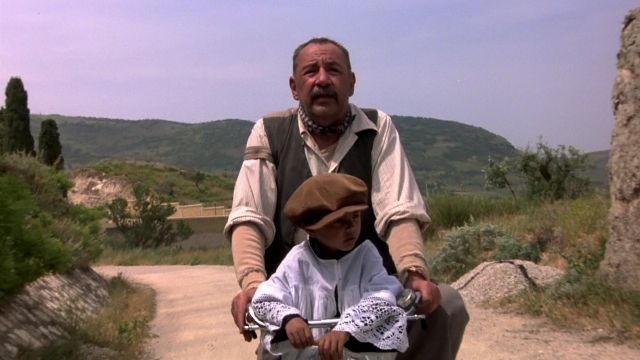Cinema Paradiso (1988) 
“A celebration of youth, friendship, and the everlasting magic of the movies.”

Director: Giuseppe Tornatore
Cast: Philippe Noiret, Enzo Cannavale, Antonella Attili
Synopsis: A filmmaker recalls his childhood, when he fell in love with the movies at his village’s theater and formed a deep friendship with the theater’s projectionist.
In the remote Italian village of Giancaldo in Southern Italy shortly after World War II, the only source of entertainment is the local cinema, the Paradiso, in which the middle-aged Alfredo (Philippe Noiret) carries out a lonely job as projectionist. Despite the loneliness of his position, he initially resists the attempts of little Salvatore ‘Toto’ Di Vita (Salvatore Cascio) to turn his projection booth into a second home. The boy is persistent, however, and pretty soon he becomes Alfredo’s right hand man, helping the older man, who quickly becomes a surrogate father to him, to operate the bulky old projector. When Alfredo loses his sight in a fire that burns down the Paradiso, Salvatore assumes the role of projectionist at the newly-built replacement cinema, Nuovo Paradiso. Motivated by his passion for movies, Toto loves his time in the booth, but Alfredo realises that, if he is to experience all that life has to offer and make the most of his abilities, he must venture into the outside world or he will become just another mildly eccentric village character.
In an early scene from Giuseppe Tornatore’s highly-rated Cinema Paradiso, we see Giancaldo’s Priest (Leopoldo Trieste — The Godfather Part II) sitting alone in the cinema with just a small bell for company. He watches the latest movie to arrive at the cinema, and whenever a couple share a kiss onscreen, he rings the bell to indicate to Alfredo the projectionist that the scene must be cut before it is shown to the villagers of Giancaldo. The strips of film lie in a box in the booth, unseen by anyone but the priest and Alfredo, and their fate provides a key to the message in Cinema Paradiso. The moments captured in those scraps of films represent life’s potential for romance and adventure, and the fact that in the village of Giancaldo they sit unseen in a box tells Alfredo that it is a village that sucks the thirst for life from its residents. Upon his death, Alfredo bequeaths these pieces of film, now spliced together, to the adult Salvatore, now a successful film director, who watches them alone in a studio theatre. This brief compilation of kisses from a diverse range of movies is close to breathtaking, the kind of sequence that will set the hairs bristling on the back of the neck of anyone who shares Salvatore’s passion for movies.
Without a doubt, a true lover of cinema will get more from Cinema Paradiso than a casual moviegoer, simply because it is directed at those people for whom cinema possesses a perhaps disproportionate level of importance in their lives. It speaks to these people in a way that it never can to those for whom movies are nothing more than an entertaining diversion. Ironically, it’s by pursuing the point that cinema isn’t life and can provide no substitute that the film becomes almost ordinary. The movie’s poignancy isn’t to be found in Toto’s loss of Alfredo, but in his loss of the era that is depicted in the first half of the film. Like the adult Toto, we spend the second half of the film looking back at the first half and wishing it could be as good.
While some of its characters are a little cartoonish, and the actor who plays the young Toto can’t act (but is as cute as a button) Cinema Paradiso is nevertheless possibly one of the best movies ever to attempt — and largely succeed — in showing the power movies can have over our emotions. The final half-hour or so — added in 2002 as a director’s cut – contributes little to the film other than to reveal what happened to the romance between the teenage Salvatore and Elena (Agnese Nano), but that moment when the adult Toto first sees Alfredo’s bequest to him will bring a tear to any genuine movie-lover’s eye.
(Reviewed 22nd October 2012)
httpv://www.youtube.com/watch?v=C2-GX0Tltgw
